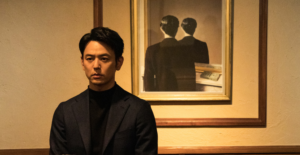La Réparation
2025

FR EN
Comment vivre suite à la volatilisation inexplicable et inexpliquée d’un proche – et même, en l’occurrence, de deux proches ? Clara va le découvrir à ses dépens. Car son père, le chef Paskal Jankovski, disparaît quelques heures avant l’attribution de sa troisième étoile, en même temps que son amant Antoine, lors d’une partie de chasse. Soumise au harcèlement des médias mais surtout désemparée, Clara ne parvient pas à aller de l’avant, jusqu’à ce que, deux ans plus tard, elle reçoive une mystérieuse invitation à un salon de gastronomie à Taïwan…
Traitant du phénomène des personnes disparues brutalement et sans laisser de traces, par accident ou de leur plein gré (ce second cas se chiffrant à au moins une dizaine de milliers d’individus chaque année rien qu’en France), « La Réparation » raconte avant tout l’enquête introspective et au bout du monde de Clara qui espère retrouver son père et son compagnon, notamment à travers des saveurs a priori disséminées tout au long de son voyage. Le long-métrage réalisé par Régis Wargnier interroge ainsi la notion d’héritage tant à l’échelle familiale qu’à l’échelle internationale – le chef Janko étant mondialement réputé, autant pour sa cuisine que pour son histoire devenue mythe.
Le film possède de fait une véritable qualité visuelle, avec des beaux portraits de personnages, des paysages enchanteurs, des présentations de plats délicieuses ainsi qu’une polychromie remarquable et brillamment façonnée. Les dialogues – en français, en anglais et en chinois – sont eux aussi assez bien recherchés. En revanche, en dépit de ce travail sur la forme, « La Réparation » manque d’un je-ne-sais-quoi de plus profond : le scénario, bien que plutôt intrigant, n’est pas des plus palpitants ou renversants, et les personnages, pour certains bancals, ne sont pas particulièrement touchants malgré la symbolique omniprésente de l’espoir qu’incarne Clara. Au demeurant, « La Réparation » reste un long-métrage esthétique au récit relativement universel et qui nous plonge dans une singulière atmosphère un peu hors du temps.
Axel Chevalier
How does one live with the unexplained disappearance of a loved one – or, in this case, two loved ones? Clara finds out the hard way. Her father, chef Paskal Jankovski, disappears a few hours before his third star is awarded, along with her lover Antoine, during a hunting trip. Subjected to media scrutiny, but above all distraught, Clara is unable to move forward, until, two years later when she receives a mysterious invitation to a gastronomy fair in Taiwan…
Dealing with the issue of people who disappear suddenly and without a trace, whether by accident or of their own free will (the latter numbering at least ten thousand every year in France alone), “La Réparation” is above all the story of Clara’s introspective, globe-trotting investigation into her hopes of finding her father and her boyfriend, particularly through the flavors seemingly scattered throughout her journey. Directed by Régis Wargnier, the film examines the notion of inheritance on both a family and international scale – chef Janko is world-renowned, as much for his cuisine as for his mysterious story.
The film has a real visual appeal, with beautiful character portraits, enchanting landscapes, delicious food presentations and remarkable, brilliantly crafted polychromy. The dialogues – in French, English and Chinese – are also quite well crafted. On the other hand, despite this effort on style, “La Réparation” lacks something deeper: the screenplay, though rather intriguing, is not the most thrilling or astounding, and the characters, some of them a bit wobbly, are not particularly touching, despite the ever-present symbolism of hope embodied by Clara. All in all, “La Réparation” remains an aesthetically beautiful film with a fairly universal narrative that draws us into a singular, out-of-time atmosphere.
Axel Chevalier

